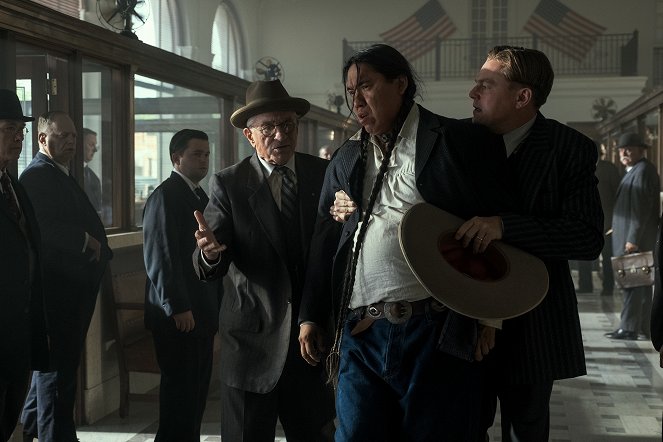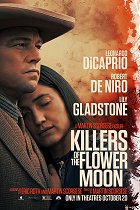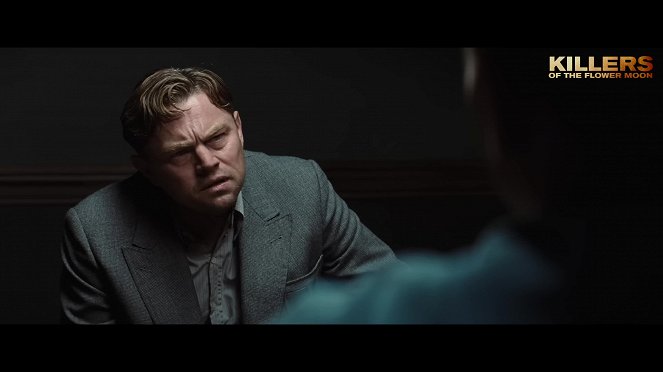Directed by:
Martin ScorseseCinematography:
Rodrigo PrietoComposer:
Robbie RobertsonCast:
Leonardo DiCaprio, Robert De Niro, Lily Gladstone, Jesse Plemons, Tantoo Cardinal, John Lithgow, Brendan Fraser, Louis Cancelmi, Tatanka Means (more)VOD (3)
Plots(1)
At the turn of the 20th century, oil brought a fortune to the Osage Nation, who became some of the richest people in the world overnight. The wealth of these Native Americans immediately attracted white interlopers, who manipulated, extorted, and stole as much Osage money as they could before resorting to murder. (Paramount Pictures)
Videos (14)
Reviews (10)
The American interpretation of the banality of evil, where “banality” is synonymous with the everyday and the ordinary, but it is not readily apparent. Scorsese needs these three and a half hours so that he can depict, with maximum disturbing effect, the paradoxes and absurdities in the actions of people who, with the support of institutionalised racism and under the banner of their own truths and idealised values, were able to live side by side with those whom they killed. Two aspects stand in opposition to each other. On one side, there is the mythology of a nation that is being corroded by adapting to an imported lifestyle, or rather to a foreign mythos of prosperity. The tragedy of the Osage consists in the fact that they tried to adapt to a foreign mythos, but from the perspective of the white outsiders, that mythos was (and still remains) meant only for themselves and not for anyone else. On the other side, we have a stubborn self-centredness underpinned by an imagined right to prosperity in a land of unlimited opportunities, which in practice means that it can be seized by any means at the expense of others. The narrative consistently makes us aware that evil does not consist in some sort of moral gymnastics that the individual uses to justify his or her opposition to good. On the contrary, the essence of evil consists in absolute rational ignorance with respect to anything foreign, including morality. Essential support for this is provided by the instilled roles, models and ideals that one has to fulfil, because the effort to fulfil them helps one not to see anything else. Fortunately, however, there is a third side, represented not by the local authorities, but by those of the state, which in Scorsese's typically idealistic vision are completely immune to the corruption and temptations of the world around them, because they are built specifically for the purpose of fighting evil. Thanks not only to the presence of DiCaprio, Killers of the Flower Moon is a reprise of The Wolf of Wall Street, in which Scorsese portrayed the perversity of egocentrism and opportunism so spectacularly that his film became a materialisation of the dreams of numerous assholes and a representation of what they should aspire to. This time, in the acting itself (from DiCaprio's clumsiness to DeNiro’s adaptation of Donald Trump’s facial expressions) and in the purposefully slow pacing, he deliberately takes care to ensure that his view of America’s values cannot in any way be misappropriated in the furtherance of those values, though the effort is ultimately futile, because nothing external will break the convinced racists and mammonists.
()
The Osage nation has found oil in their territory and became rich. But where there is money, there are people who want to get their hands on it, and they will be going over dead bodies. Martin Scorsese delivers a dense drama about human envy, anger and cruelty that is not entirely audience-friendly and forces you to spend three and a half hours in the company of repulsive people. Leonardo DiCaprio and Robert De Niro give brilliant performances here, but the slow pace and a narrative that doesn't rush anywhere demand more attention and patience from the audience than usual. Scorsese is uncompromising, so be ready to do your fair share of time with his newest film. And he's certainly not going to make it easy.
()
Here, more than with other films, you realize that even great filmmakers should have a producer's oversight, someone to tell them that such monstrous running time is untenable. Martin Scorsese's seminal works always flirted with three hours, but they had incredible pacing and were watchable in one breath. Here, I was hooked only with the arrival of the investigators and the final catharsis, which was powerful, so it took like two horus for things to get going, and I write this as someone who likes slow films and their gradual introduction to the plot. Nasty things happen, but I felt almost no tension and the bland monotone music didn't help. And someone should tell Leonardo DiCaprio that constantly crabbing his mouth into an inverted U is not a sign of good acting. So aside from the traditionally reliable Robert De Niro, I was only impressed with Lily Gladstone. Her quiet strength, soulful expression and engaging minimalist acting was something to behold. I wouldn't hesitate to call her the heart of the whole film, the one element of goodness in the human filth around her. I'm glad to see that similar artistically ambitious films are still being made in these bastardised, tik-tok times, but I'm afraid Marty won't be expanding his Oscar collection this time around.
()
Martin Scorsese and Eric Roth have taken a muddled, mediocre book and turned it into a great American novel in film form. Killers of the Flower Moon is a monumental, multi-voiced and timeless chronicle of the fall of a community whose lust for wealth is stronger than love, even though its members are aware that they are preparing the next generation for the future through their own behaviour. The film is dark and slow and feels longer than The Irishman, for example, but that length is justified, as it makes it possible for us to gradually get into that community and see at first hand how greed and cynicism gradually and inevitably spread to the country, become entrenched and consume the characters. Throughout the film, we find ourselves in close proximity to a confident and seemingly all-powerful, yet essentially banal and sometimes comically obtuse evil whose proper punishment seems rather unlikely, which is exactly as frustrating and exhausting as Scorsese most likely intended it to be. By comparison, the voice of goodness is weakened by sickness and the “medicine” administered, and it is limited to naming the one who died (which is something of a Scorsese trademark). Despite that – and thanks to the dignity that Lily Gladstone radiates – it has a central, evidentiary role in the narrative. Killers is primarily an indictment of the murderers whose existence should ideally have been erased from American history (because many still profit from their crimes to this day) and an emphatic demand to give back a sense of humanity to those whose lives were reduced to a few thousand dollars decades ago; the director’s closing cameo leaves us in no doubt about this. ___ Scorsese directs his lament with the surehandedness of a master. This time, he economises on the spectacular dolly and Steadicam shots, instead relying on the actors and Thelma Schoonmaker’s feel for rhythm. As a message about the substance of American capitalism, his plunge into the darkness could eventually become an equally essential work as Giant (1956), Once Upon a Time in the West, The Godfather and There Will Be Blood. At the same time, the intense hopelessness and the atmosphere of irreversible decline reminded me of Tárr’s films. No, that won’t come easy in the cinemas for this proof that you can still make your magnum opus in your seventies. 90%
()
Killers of the Flower Moon is a monumental and masterfully written, acted and directed lament for the decline of society that slowly and forcefully delves into the darkness of America’s controversial history with a focus on the nature of evil in a story about the covered-up crimes perpetrated against the indigenous population in the name of the desire for power and wealth. It is an epic portrait of the United States built precisely on a mixture of gangster movies and westerns, two American genres based on the thematisation of amoral behaviour.
()
Gallery (106)
Photo © Apple TV+



Ads